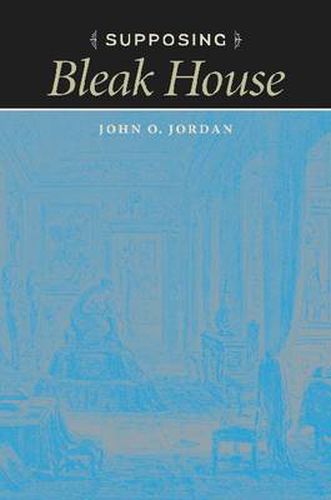Readings Newsletter
Become a Readings Member to make your shopping experience even easier.
Sign in or sign up for free!
You’re not far away from qualifying for FREE standard shipping within Australia
You’ve qualified for FREE standard shipping within Australia
The cart is loading…






This title is printed to order. This book may have been self-published. If so, we cannot guarantee the quality of the content. In the main most books will have gone through the editing process however some may not. We therefore suggest that you be aware of this before ordering this book. If in doubt check either the author or publisher’s details as we are unable to accept any returns unless they are faulty. Please contact us if you have any questions.
Supposing
Bleak House
is an extended meditation on what many consider to be Dickens’s and nineteenth-century England’s greatest work of narrative fiction. Focusing on the novel’s retrospective narrator, whom he identifies as Esther Woodcourt in order to distinguish her from her younger, unmarried self, John Jordan offers provocative new readings of the novel’s narrative structure, its illustrations, its multiple and indeterminate endings, the role of its famous detective, Inspector Bucket, its many ghosts, and its relation to key events in Dickens’s life during the years 1850 to 1853.
Jordan draws on insights from narratology and psychoanalysis in order to explore multiple dimensions of Esther’s complex subjectivity and fractured narrative voice. His conclusion considers Bleak House as a national allegory, situating it in the context of the troubled decade of the 1840s and in relation to Dickens’s seldom-studied A Child’s History of England (written during the same years as his great novel) and to Jacques Derrida’s Specters of Marx. Supposing
Bleak House
claims Dickens as a powerful investigator of the unconscious mind and as a
popular
novelist deeply committed to social justice and a politics of inclusiveness.
$9.00 standard shipping within Australia
FREE standard shipping within Australia for orders over $100.00
Express & International shipping calculated at checkout
This title is printed to order. This book may have been self-published. If so, we cannot guarantee the quality of the content. In the main most books will have gone through the editing process however some may not. We therefore suggest that you be aware of this before ordering this book. If in doubt check either the author or publisher’s details as we are unable to accept any returns unless they are faulty. Please contact us if you have any questions.
Supposing
Bleak House
is an extended meditation on what many consider to be Dickens’s and nineteenth-century England’s greatest work of narrative fiction. Focusing on the novel’s retrospective narrator, whom he identifies as Esther Woodcourt in order to distinguish her from her younger, unmarried self, John Jordan offers provocative new readings of the novel’s narrative structure, its illustrations, its multiple and indeterminate endings, the role of its famous detective, Inspector Bucket, its many ghosts, and its relation to key events in Dickens’s life during the years 1850 to 1853.
Jordan draws on insights from narratology and psychoanalysis in order to explore multiple dimensions of Esther’s complex subjectivity and fractured narrative voice. His conclusion considers Bleak House as a national allegory, situating it in the context of the troubled decade of the 1840s and in relation to Dickens’s seldom-studied A Child’s History of England (written during the same years as his great novel) and to Jacques Derrida’s Specters of Marx. Supposing
Bleak House
claims Dickens as a powerful investigator of the unconscious mind and as a
popular
novelist deeply committed to social justice and a politics of inclusiveness.